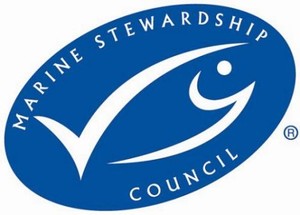Sustainable Seafood policies for Coles and Woolworths
by Jeni Bone on 21 Mar 2011

Look for this logo on seafood that’s certified sustainable. SW
To coincide with Sustainable Seafood Day, Friday 18 March, and to keep pace with a rising global demand for seafood, both main Australian supermarkets have announced steps they are taking to provide fish sourced from sustainable fisheries.
Now in its fifth year, Sustainable Seafood Day invites cafes, restaurants, food service companies, seafood producers and the general public to show their support for sustainable fishing practices by highlighting, serving and eating Marine Stewardship Council (MSC) certified seafood bearing the blue ecolabel.
Woolworths is working in partnership with the London-based MSC to introduce two new lines of canned tuna and salmon carrying the MSC blue tick of approval, and to delist orange roughy and yellowfin tuna.
The company said it was undertaking an assessment with the Sustainable Fisheries Partnership Foundation of its wild-caught fish to identify the top four species which are available in sustainable supply.
Woolworths Director of Supermarkets, Greg Foran says: 'We want to assist customers in making more informed and sustainable fish choices. We are enabling this by providing options, at an accessible price point.'
Patrick Caleo of the MSC says: 'It’s great to see Woolworths playing a key role in supporting sustainable fishing. This is a big step and we are extremely pleased to be working with Australia’s largest supermarket chain to help transform the seafood market to make it more sustainable. By introducing MSC certified canned Salmon and Albacore Tuna, Woolworths are providing consumers with the tools to make more informed choices, and are making a real commitment to helping safeguard fish stocks for future generations.'
Following advice from fisheries experts, Woolworths has delisted fresh Yellowfin Tuna and Orange Roughy from all Woolworths’ stores, to ease pressure on the species.
Woolworths is also currently undertaking an assessment with the Sustainable Fisheries Partnership of its wild-caught fish to identify which are available in sustainable supply. The assessment will assist in identifying fisheries that need improvement in their sustainability practices.
Woolworths will offer funding incentives under its Fresh Food Farming sustainable food program to a select number of fisheries in its supply chain to conduct MSC pre-assessments and develop improvement plans for more sustainable practices leading to MSC certification.
'By supporting fisheries through the MSC pre-assessment process, and any required fisheries improvements, Woolworths is taking a strong leadership role, and will be working in partnership with the fishing industry to contribute to real improvements on the ground. As a direct result of their support, select fisheries that may not have been able to meet the cost of the MSC pre-assessment can now do so,' Caleo adds.
Coles also announced a partnership with the World Wildlife Fund to review fresh seafood and to take advice on sourcing fish on a sustainable basis.
Greenpeace spokesperson, Dr Cat Dorey, says that while it was pleasing to see supermarkets move towards a sustainable policy, MSC was considered not to have 'strong enough standards'.
She believes the relationship with the Sustainable Fisheries Partnership - a non-government organisation - gives the move credibility as that organisation was a strong driver for change, but she was more sceptical of the arrangement with MSC - a London-based organisation owned by WWF and Unilever.
'But when it comes to MSC we have quite a lot of concern. We don't think their standards are strong enough,' Dr Dorey says.
Doubts have been raised at times about MSC's certification process and whether it is compromised by commercial concerns. Armineh Mardirossian, group manager of corporate responsibility at Woolworths, said the supermarket was confident of its credentials.
'For us the Marine Stewardship Council is the most credible and most rigorous certification process around,' she continues.
MSC’s Patrick Caleo says it's a shame other companies have been slower to adopt sustainable products. 'It may be because the issues associated with marine environment aren't so often talked about so often here in Australia,' he observes, adding that the involvement by retail giants Coles and Woolies would hopefully provide momentum for other companies to follow.
More at http://www.msc.org/cook-eat-enjoy/ssd
If you want to link to this article then please use this URL: www.sail-world.com/81532